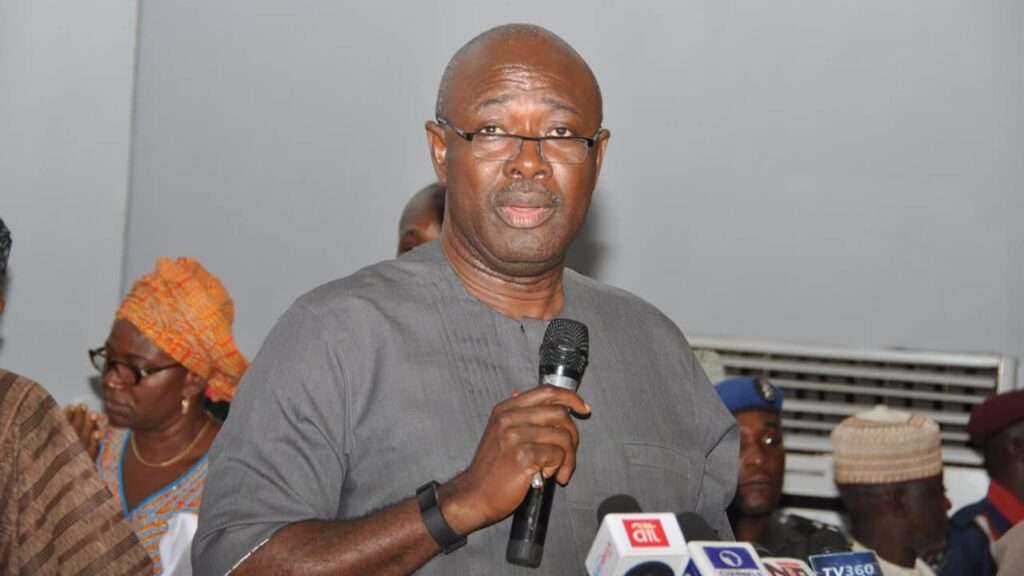The Minister of State for Petroleum, Senator Heineken Lokpobiri, has attributed the continued availability of fuel during the 2024 festive season to the full deregulation of the downstream oil sector, which included the removal of fuel subsidies.
The Minister made this statement following his unannounced inspection of several petrol stations in Yenagoa, Bayelsa State. The purpose of the visit was to assess the effectiveness of the ongoing deregulation policy and to verify fuel availability in the area.
“You can recall that the norm has been that during festive seasons, when demand spikes, there is always product scarcity, which leads to price hikes.
“But last year, there was product availability, and this year, we also see that fuel availability is sustained, and the prices are stabilizing.”
Senator Heineken Lokpobiri, Minister of State for Petroleum
Lokpobiri emphasized that the removal of fuel subsidies under the administration of President Bola Tinubu has not only stabilized the availability of petrol but has also prevented the usual seasonal fuel scarcity and price hikes that Nigerians typically experience during festive periods.
This marked the second consecutive Christmas under President Tinubu’s administration in which fuel has been available across the country during the holiday season, a stark contrast to the frequent fuel shortages and inflated prices in previous years.
He further highlighted the success of the government’s policy in ensuring that the downstream oil industry remains responsive to both consumer demand and supply logistics, which, in turn, helped mitigate the festive season fuel crisis that has historically plagued the country.
Accompanied by officials from the Nigerian Midstream and Downstream Petroleum Regulatory Authority (NMDPRA), the Minister visited several petrol stations in Yenagoa, including Rainoil and NNPC stations in Edepie, Rano Oil in Opolo, and the NNPC Mega Station located on the Sani Abacha Expressway.
During his inspection, Lokpobiri personally checked fuel dispensers to ensure that pump attendants were selling fuel in accordance with the displayed prices.
He acknowledged the slight variation in fuel prices across different stations, noting that such variations were indicative of the successful implementation of the deregulation policy.
According to the Minister, some stations were selling fuel for ₦1,050 per litre, while others charged ₦1,020. The NNPC Mega Station, which is directly controlled by the government, had fuel priced at ₦999 per litre.
“This is the true essence of deregulation. With deregulation, we see that prices fluctuate based on market forces, and this is why we are seeing different price points in various stations.
“The most important thing, however, is that the prices are stabilizing, and consumers are able to purchase fuel without the fear of long queues or artificial scarcity.”
Senator Heineken Lokpobiri, Minister of State for Petroleum
Vigilance Against Suspicious Practices

In addition to highlighting the benefits of deregulation, the Minister urged Nigerians to remain vigilant and report any irregularities in fuel dispensing at stations.
Lokpobiri expressed concern over potential malpractices, including faulty meters or cases of filling stations dispensing less fuel than what is paid for. “What we have seen in the past is that some stations might claim to dispense 100 litres but actually deliver only 50 litres,” Lokpobiri warned.
“It is important for Nigerians to pay attention to the meters and the prices.
“If you notice anything suspicious—such as a station claiming to have dispensed more fuel than your car can accommodate—please raise the alarm. Together, we must work to ensure that all Nigerians get the full benefits of deregulation.”
Senator Heineken Lokpobiri, Minister of State for Petroleum
The Minister’s comments serve as a reminder to consumers to be proactive in protecting their interests by monitoring their fuel purchases closely and reporting any discrepancies to regulatory authorities. He stressed that such measures would help to safeguard the integrity of the fuel supply chain and promote transparency in the sector.
Senator Heineken Lokpobiri’s remarks highlight the success of the government’s decision to remove fuel subsidies and fully deregulate the downstream oil sector.
This policy has not only contributed to the steady availability of fuel during the 2024 festive season but also ensured that prices remain relatively stable despite the ongoing adjustments in the market.
While the new fuel prices remain a challenge for some Nigerians, the government’s focus on market-driven pricing and increased supply has alleviated the pressure of fuel scarcity, offering a more sustainable future for the country’s oil industry.
READ ALSO: African Development Bank Invests $10 Million to Boost for Climate Tech in Sub-Saharan Africa



















